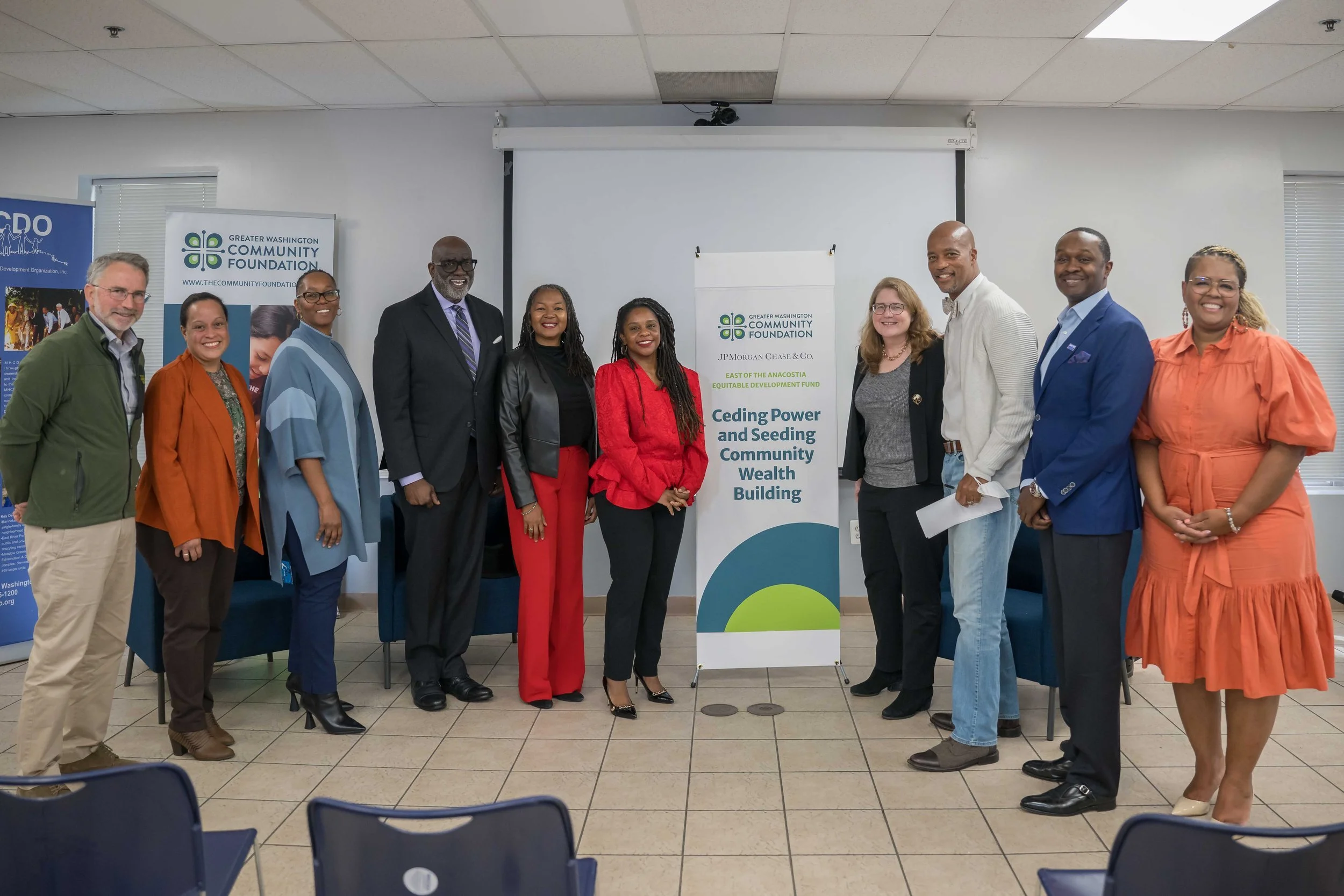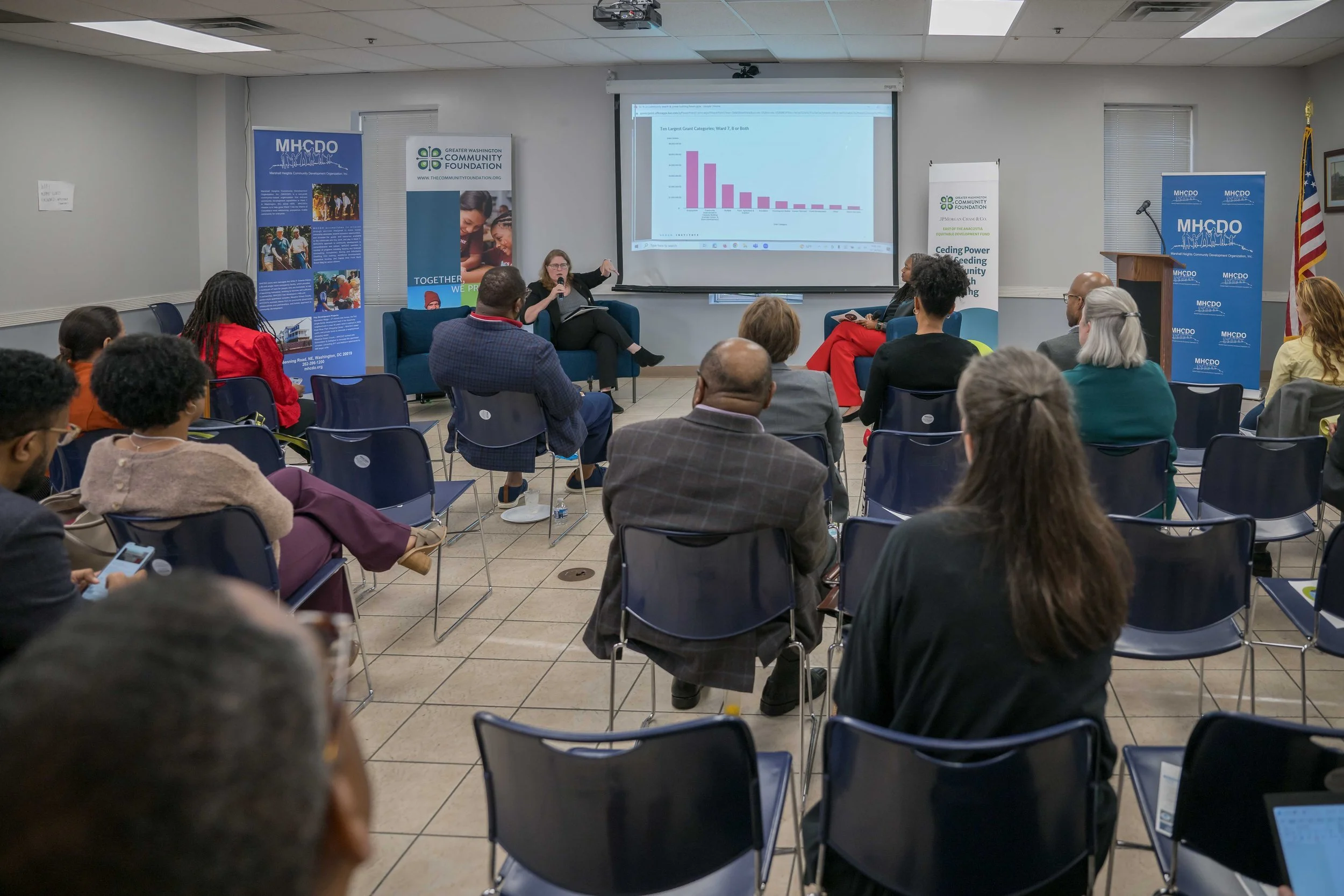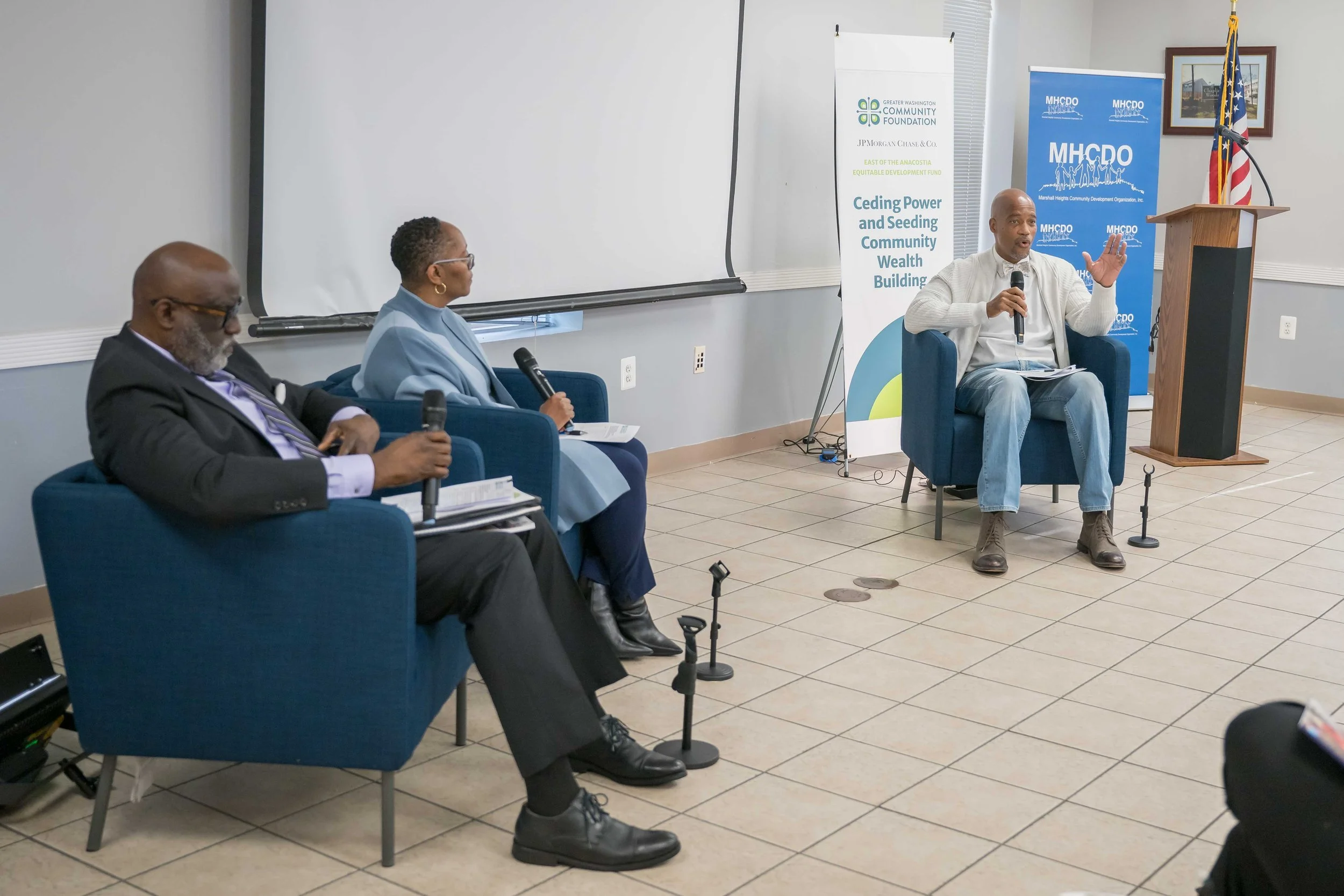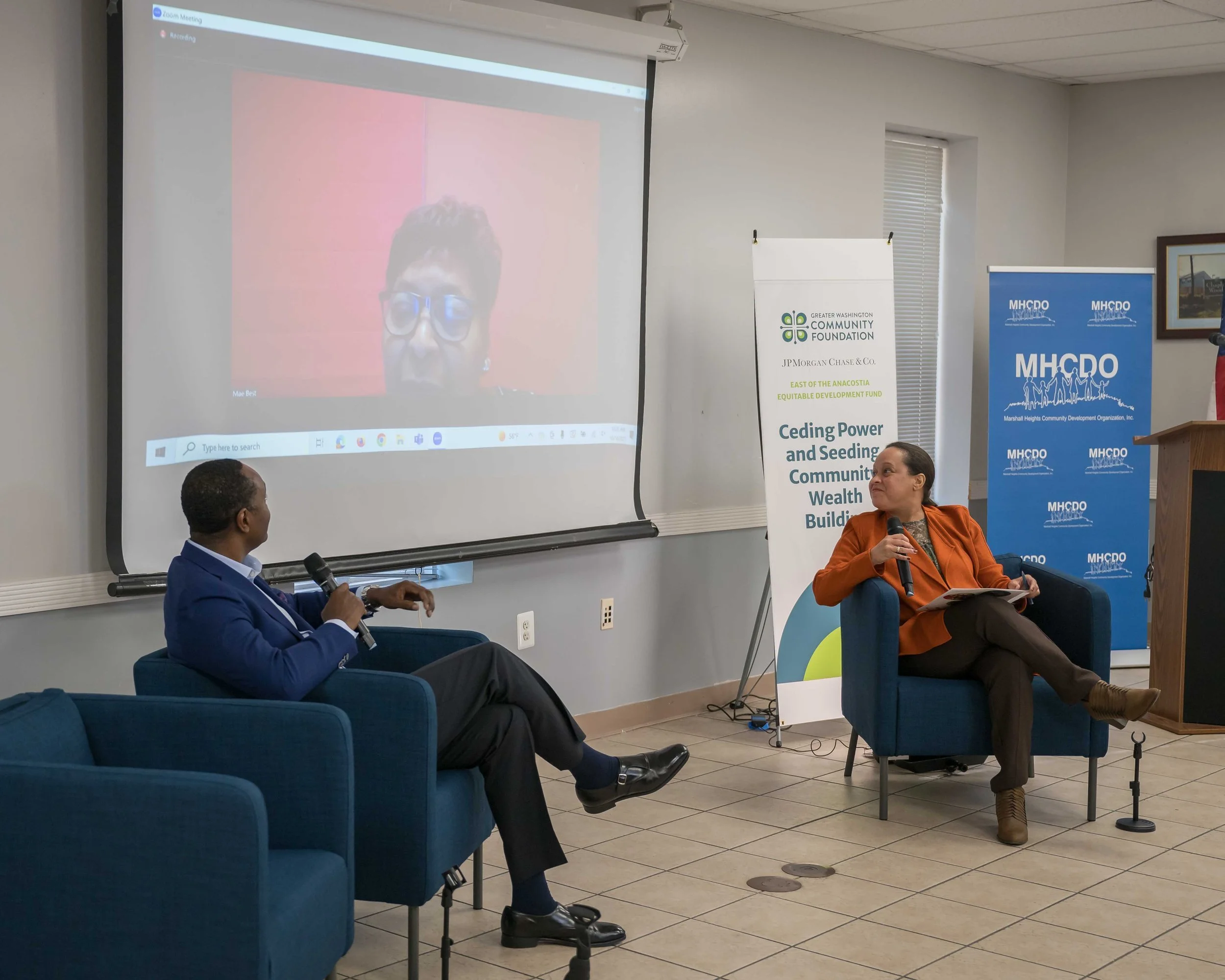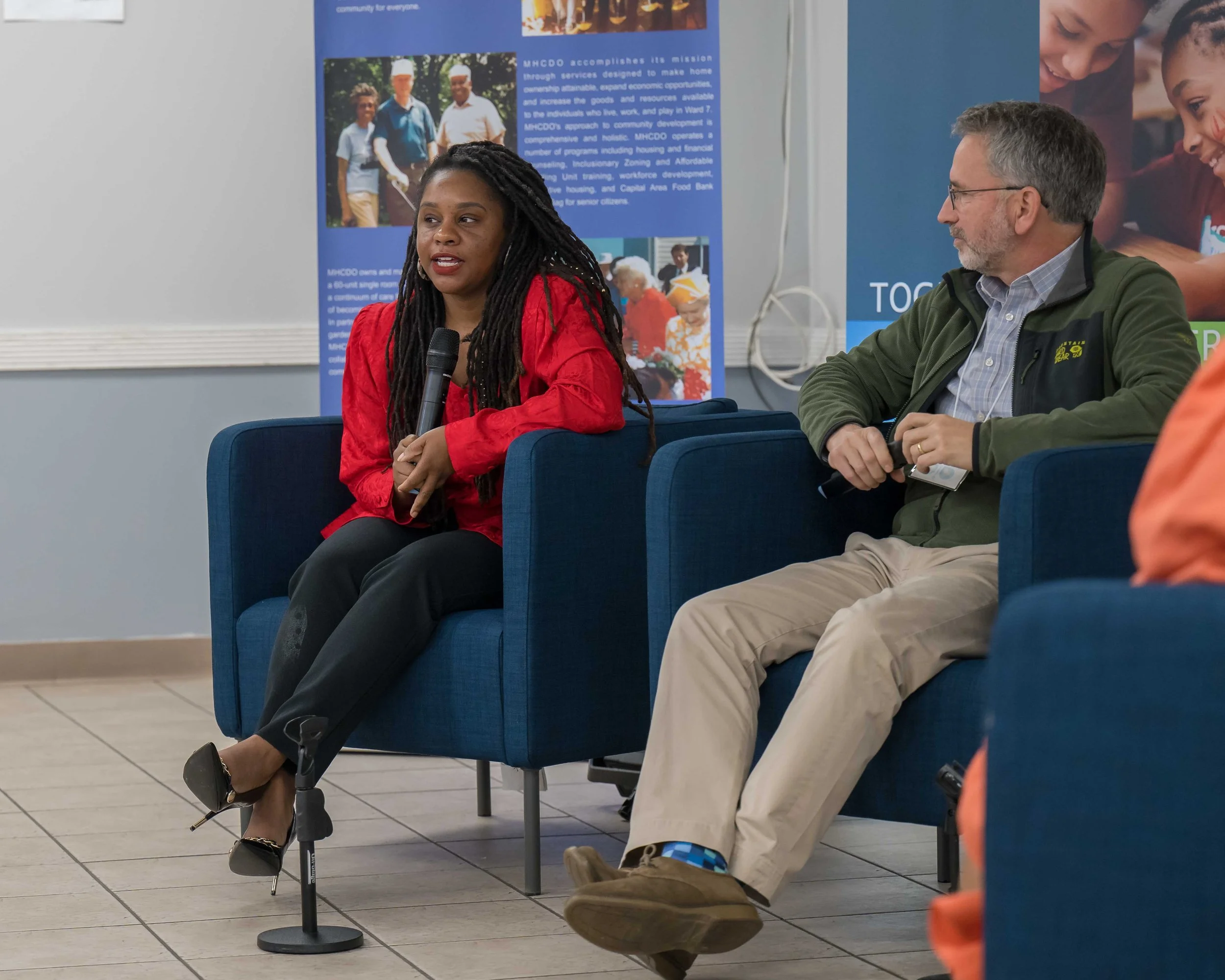Ceding Power and Seeding Community Wealth Building in DC Ward 7 and 8
Earlier this month, The Community Foundation and JP Morgan Chase convened funders and nonprofit partners at the Marshall Heights Community Development Organization to hear directly from community partners about the best ways to promote community wealth building and equitable development in DC Wards 7 & 8.
“We want to bridge the gap between funders and communities,” Dr. Marla Dean, Senior Director of the Health Equity Fund shared. “We are here to discuss how philanthropy can aid community goals by supporting community controlled grantmaking and community led decision-making.”
The event was made possible by the East of the Anacostia River Equitable Development Fund – an investment of JP Morgan Chase dedicated to bridging the economic and racial wealth divide in DC.
In a city where White wealth is 81 times that of Black wealth, 92 percent of residents living in Wards 7 & 8 are Black. For years, many of these have residents struggled to gain access to healthy food, medical care, employment and homeownership opportunities.
While traditional investments have been made from both public and private partners to help meet these needs, The Community Foundation and JP Morgan Chase wanted to explore if ceding more power and resources to the community could be the key to seeding greater community wealth.
“Philanthropists and residents sometimes have a tendency to talk past each other when it comes to impact,” Tonia Wellons, President & CEO of The Community Foundation shared. “The more we can empower and cede power to those within these communities, the better we can understand what it will take to really make a difference.”
The event kicked off with a conversation with Mary Bogle, Principal Research Associate at the Urban Institute. Bogle, who was commissioned by JP Morgan Chase and The Community Foundation to conduct research on philanthropic efforts East of the River, talked about the need to prioritize community voice in ongoing efforts.
“The challenges that residents in Wards 7 & 8 face are different than those faced in other parts of DC,” Bogle shared. “Unique challenges, call for unique solutions – specifically, community-controlled grantmaking models.”
Bogle was followed by a panel of organizations from Ward 8 including Mustafa Abdul- Salaam who facilitated the Ward 8 Community Economic Development Report and Tiffany Williams, President & CEO of Martha’s Table.
“We’re at a moment when we have the opportunity to transform the relationship between philanthropy and community,” Abdul-Salaam shared. “If you want to make a change in the communities we live in, you will not do it unless you talk to me or my neighbors about the changes that need to be made.”
Abudul-Salaam recently released “A Dream Deserved: Realizing Our Collective Emergence” a detailed community-driven report that highlights the qualitative and quantitative needs of Ward 8 residents. The report was made possible by the Bainum Family Foundation, in addition to contributions from JP Morgan Chase, The Community Foundation, and others.
“Putting cash into people’s hands is one of the most effective ways to help them out of poverty,” Williams shared when asked about some of the most innovative ways to meet the needs highlighted in the report. Since the pandemic, Martha’s Table has been an advocate for innovative funding initiatives in Wards 7 & 8 including cash transfer programs and Community Impact grants.
“Until we have capital tied into a community like Ward 8, then nothing changes.” Abdul-Salaam added. “We have a poverty-building economy right now – we want to move towards a wealth building economy.”
Among the ideas that Abdul-Salaam and Williams championed included a Black Think Tank that would leverage intellectual capital in Wards 7 & 8 to design and implement community-based innovations like guaranteed incomes, child saving accounts, broad based ownership models and strategic economic participation.
From Ward 8, the conversation then turned towards Ward 7 and a panel discussion with Mae Best, Executive Director of the East River Family Strengthening Collaborative and Babatunde Oloyede, President & CEO of Marshall Heights Community Development Organization who hosted the event.
“We have a unique opportunity to chart our own course,” Oloyede shared. “For communities to lead the effort and the change.”
“Rather than talk about what’s good and bad in our community, right now, let’s talk about the art of the possible.”
The Marshall Heights Community Development Organization is one of Ward 7’s oldest community development organizations that supports housing and economic development opportunities for residents.
“What many organizations in Ward 7 are doing right now is putting an emergency band-aid on families,” Oloyede described. “What we need to do is provide them with meaningful, generational wealth building opportunities.”
“We need the resources to help families and communities reach their highest potential,” Best added. “Right now, we’re really lacking in a number of things that could help make a family - and a community – whole.”
Best and Oloyede said they would love to see the same level of investment in Ward 7 as has been put into other sections of DC, including U St and H St.
“We want to see redevelopment in our commerce corridors like Minnesota and Pennsylvania Avenue,” Oloyede explained. “We want to see the same amenities that we see in other parts of the city – but we want it to be done in a way that ensures that the current residents are included; that they are able to participate in that development and enjoy those amenities.”
“The time is now! We need to be as intentional and proactive as we possibly can be; let’s work together so we can marshal the positive change to make this dream a reality for this community.”
The final panel discussion featured Dana Hall and Dan Tangherini of the Emerson Collective.
The Emerson Collective is a social impact collective with the goal of reducing barriers for people to reach their full potential by investing in ideas and social entrepreneurs. In June, they partnered with local organizations to help launch Sycamore & Oak, a new retail center for Black entrepreneurs living East of the Anacostia.
“We want a future where there’s more opportunities,” Tangherini shared. “Where people have more opportunities for expression, for growth, and for wealth.”
“That means creating a place where there is opportunity for Black-led organizations to collaborate and draw strength from each other.”
“We need to start thinking about the power dynamics in funding and how we can be intentional about tapping into those dynamics to promote positive change,” Hall added. “How do I make sure I have a diverse pool of thought when I’m engaging in this work? How do I create an environment where everyone feels like they have a place at the table?”
“Most importantly, we need to trust that the best way to get a better understanding of what the community is interested, is to start with the community itself.”
“We want to seed (with an ‘S’) growth; not just cede funding,” Tangherini said, referencing the title of the event. “That means this can’t just be a ‘grant-by-grant process. It needs to be a systematic examination of our systems to learn the lessons from what has been done -- and work together with the community to find ways to make them even better.
Click here for more photos of the event! For more information about how you can get involved in investing in Wards 7 & 8, contact Dr. Marla Dean at [email protected]


